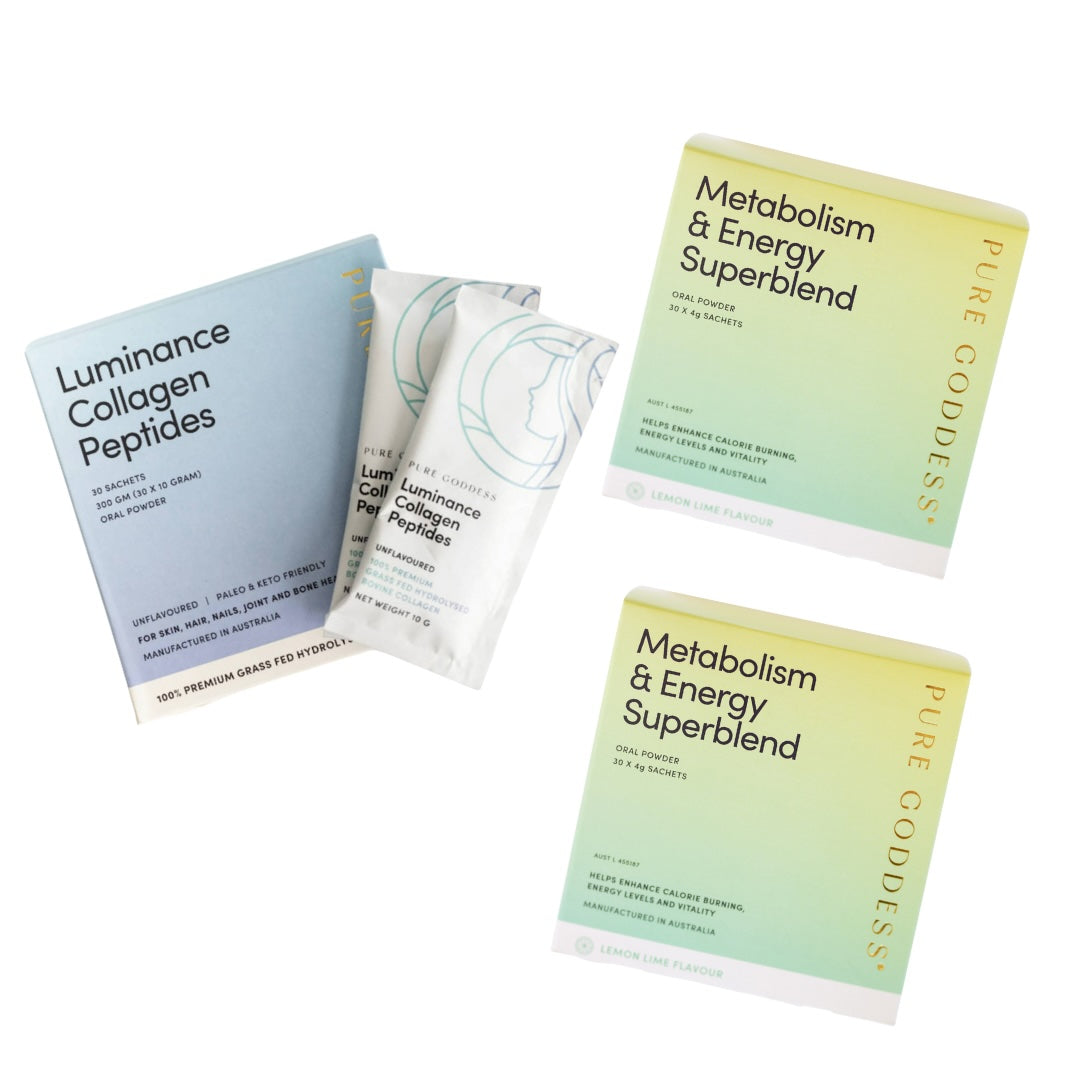8 Reasons You Are Gaining Weight In Midlife
As we journey through life, our bodies undergo numerous changes. One of the most common and frustrating experiences for many women is the tendency to gain weight during midlife. This phenomenon, often referred to as the middle-age spread can be both mind-blowing and very disheartening.
However, understanding the reasons behind this weight gain can empower us to take proactive steps towards maintaining a healthy weight. Let's explore eight key explanations for midlife weight gain and the offer of some practical advice on how to combat it.
1. Hormonal Changes
One of the primary culprits behind midlife weight gain is hormonal changes. For women, the onset of menopause typically occurs between the ages of 45 and 55. During this time, estrogen levels can dramatically decline, which can lead to a redistribution of body fat, particularly around the midsection. Men aren't exempt from hormonal shifts either. As they age, testosterone levels gradually decrease, which can result in reduced muscle mass and a slower metabolism.
These hormonal changes don't just affect where we store our fat; they can also influence our appetite and energy levels. Many people find themselves craving high-calorie foods more frequently or feeling less motivated to exercise, both of which can contribute to weight gain.
The Intricacies of Slowing Metabolism in Midlife
Basal Metabolic Rate, or BMR measures the calories needed to perform our body's most basic (basal) functions, like breathing, circulation, and cell production. BMR accounts for about 60-75% of the calories you burn each day, making it a crucial factor in weight management.
Research shows that BMR typically decreases by 1-2% per decade after age 20, with a more noticeable decline after age 40. This means that by the time you reach your 50s, your body might be burning 100-200 fewer calories per day compared to your 20s, even if your weight and activity level remain the same.
Evidence suggests that if you add a natural supplement to your diet, which gives your metabolism that all important boost it can help to enhance your health and weight loss goals.
Metabolism and Energy Superblend is an all natural powdered supplement that can help to boost metabolism, enhance calorie burning, curbs cravings, suppresses appetite and increases energy levels. We created Pure Goddess and our best selling Superblend when we could not get rid of the mid life spread even though we had tried everything!
2. The Loss of Muscle Mass
Sarcopenia, the age-related loss of muscle mass, is a key contributor to slowing metabolism. After age 30, people can lose 3-5% of their muscle mass per decade, with the rate of loss increasing after age 60. This loss is particularly significant because, Muscle tissue is metabolically active. It burns more calories than fat tissue, even when you're not exercising.
Muscle plays a role in glucose metabolism. Less muscle can lead to decreased insulin sensitivity, potentially contributing to weight gain and increased risk of type 2 diabetes.
To put this into perspective, a pound of muscle burns about 6 calories per day at rest, while a pound of fat burns only 2 calories. This means that as you lose muscle and gain fat, your overall calorie burn decreases significantly, even if your weight stays the same, crazy right.
Research suggests that collagen supplementation may help increase bone mineral density, particularly in postmenopausal women who are more susceptible to bone loss. One study examined how Bovine Collagen supplementation controlled the progression of osteoarthritis in post-menopausal women, with participants of the study reporting better quality of life and improvement in pain when supplementation was taken.

3. Decreased Physical Activity
Life in our 40s and 50s often comes with increased responsibilities and time constraints. Many people find themselves juggling demanding careers, family obligations, and other commitments, leaving less time for regular exercise. Additionally, age-related factors like joint pain or reduced energy levels can make it more challenging to maintain an active lifestyle.
The decline in physical activity not only burns fewer calories directly but also contributes to the loss of muscle mass mentioned earlier. This creates a cycle where decreased activity leads to less muscle, which in turn lowers metabolism, making it even easier to gain weight.
4. Calorie needs decrease
As we age, our calorie needs decrease due to a natural decline in metabolism and a reduction in muscle mass. This means that the same diet that maintained your weight in your 30s may lead to weight gain in your 50s.
In midlife, the body becomes more efficient at storing excess calories as fat, making it crucial to adjust dietary habits accordingly. To prevent weight gain, it's important to consume nutrient-dense foods that provide essential vitamins and minerals without excessive calories. Focus on smaller portion sizes and increase your protein intake.
This can be difficult when your appetite is raging, and even harder if you are in perimenopause or menopause because the effects of changes in estrogen and progesterone levels can really impact appetite in a negative way and also make us more susceptible to sugar cravings. Increasing protein and cutting down on sugar can help reduce appetite and so can taking an appetite suppression supplement.
If you struggle with sugar cravings then download our FREE 46 page Ebook '3 Day Sugar Detox' here.

5. Stress and Cortisol
Midlife can be a particularly stressful time, with career pressures, family responsibilities, and potentially caring for aging parents. Chronic stress triggers the release of cortisol, often called the "stress hormone." While cortisol plays important roles in the body, consistently elevated levels can lead to increased appetite, particularly for high-calorie, comfort foods.
6. Changes in Sleep Patterns
As we age, many of us experience changes in our sleep patterns. We may have trouble falling asleep, wake up more frequently during the night, or find ourselves unable to sleep as long as we used to. Poor sleep quality and quantity have been linked to weight gain through several mechanisms.
Lack of sleep can disrupt the balance of hormones that regulate hunger and fullness, leading to increased appetite and cravings for high-calorie foods. Additionally, when we're tired, we're less likely to have the energy or motivation to exercise and more likely to make poor food choices.
Read our blog '7 Solutions to Insomnia in Perimenopause' if you are having difficulties with your sleep.
7. Medications and Health Conditions
Midlife is often a time when various health conditions begin to emerge, and many of these conditions – or their treatments – can contribute to weight gain. For example, conditions like hypothyroidism, which becomes more common with age, can slow metabolism and lead to weight gain.
Certain medications commonly prescribed in midlife, such as antidepressants, beta-blockers for high blood pressure, or insulin for diabetes, can have weight gain as a side effect. It's important to discuss any concerns about medication-related weight gain with your healthcare provider, as there may be alternative treatments available.

8. Dietary Habits and Nutritional Needs
In midlife, as women we often experiencing additional unwanted weight gain. Hormonal changes during midlife can lead to a slower metabolism and increased fat storage, making weight management more challenging. Adopting a balanced diet rich in whole foods, including plenty of fruits, vegetables, lean proteins, and whole grains, is crucial.
Reducing processed foods, sugars, and unhealthy fats can help in controlling weight. Additionally, adequate intake of calcium and vitamin D is essential to support bone health, while fibre rich foods aid in digestion and help maintain a feeling of fullness. Regular physical activity, coupled with mindful eating practices, can further assist in achieving a healthy weight and overall well-being during this transitional phase.
Metabolism & Energy Superblend contains 3000 mg of high quality soluble plant fiber which when consumed with water helps keep you feel fuller for longer, reduces appetite and decreases unhealthy food cravings, all while supporting a healthy metabolism and blood sugar levels. You can read more about how our Superblend works here.
Alcohol Consumption for many adults, alcohol becomes a more frequent part of social interactions and stress relief as they enter midlife. However, alcoholic beverages are often high in calories and can contribute significantly to weight gain. A glass of wine contains about 120-150 calories, and a beer can have 150-200 calories or more.
Moreover, alcohol can impair judgment when it comes to food choices, leading to overeating or indulging in high-calorie snacks. It also interferes with the body's fat-burning processes, as the liver prioritises breaking down alcohol over burning fat for energy.
Here's how to can take action
While these factors can make weight gain seem inevitable, it's important to remember that it's not a foregone conclusion. By understanding these challenges, we can take proactive steps to maintain a healthy weight:
- Stay active with a mix of cardio and strength training to boost metabolism and preserve muscle mass.
- Prioritise sleep and stress management through techniques like meditation or yoga.
- Adjust your diet to meet your changing nutritional needs, focusing on nutrient-dense, whole foods.
- Be mindful of portion sizes and pay attention to hunger cues.
- Limit alcohol consumption and choose lower-calorie options when you do drink.
- Regular health check-ups can help identify and address any underlying health issues or medication side effects.
- Build a support network of friends or join groups focused on healthy living for motivation and accountability.
- Incorporate a natural daily health supplement into your diet that will enhance your metabolism, curb your cravings, reduce your appetite, give you that all important energy boost and feeling of vitality, we have just what you need.
The more you learn the more you can change
By understanding the complex interplay between aging, muscle mass, and metabolism, you can make informed decisions about your diet and exercise habits.
With the right strategies, you can work with your changing body to stay fit and healthy throughout midlife and beyond. Here at Pure Goddess we understand the woes that come with aging, weight gain, slowing metabolism, craving unhealthy foods and snacks and losing that vitality for life.
Remember, while weight gain in midlife is common, it's not inevitable. By understanding the factors at play and making conscious lifestyle choices, we can navigate this phase of life with health and vitality. It's never too late to adopt healthy habits that will serve us well in the years to come.





Leave a comment
This site is protected by hCaptcha and the hCaptcha Privacy Policy and Terms of Service apply.